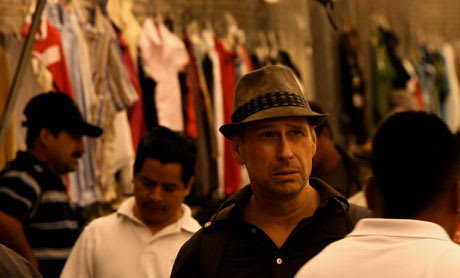As the title suggests, this particular grouping of shorts examines the nature of geographic and ideological dysphoria, featuring people and animals out of their element. And while this topic is typically given the comic, "fish out of water" treatment, only one of these shorts devolves in that rudimentary capacity.
Said devolving comes at the tail end of the program with The Immigrant, where Scott Thompson emigrates to L.A. and finds himself working illegally with Mexicans on Dave Foley's unkempt garden. Many jokes about Kids in the Hall abound with comments like, "it appealed to a certain underground college demographic." However, the only laughs come from the implication that Margaret Cho defecated on Thompson's kitchen floor in the late '90s.
More troubling is Reinaldo Arenas, which is an experimental documentary of sorts, starting out with a voiceover from a seemingly discontent immigrant and moving on to some disturbing news footage and a story of crass human vulgarity. This is followed-up by the Latvian charcoal animation of Ursus, wherein a despondent circus bear attempts to get back to his roots, only to discover the difficulty in reversing change.
Also representing the animation front is German short The Changeling, wherein a medieval (hence the style of animation) couple take on a troll baby when theirs is stolen. Commenting on gender constructs and the nature of maternal need, it gives us something to think about during its brief runtime.
Less appealing is somewhat smug short Odysseus' Gambit, wherein a man taken from Cambodia by the U.S. military in his childhood discusses how chess keeps him sane. It covers the role of obligatory piousness, much like I am John Wayne, where a young man named Taco (a vaginal reference) takes his dead cousin's horse out for a ride in an urban locale while grieving.
Making this program of shorts more palatable is the acutely observant The Crossing of the Living Room. It features a woman struggling with how to spend her time after kicking alcoholism, noting that quiet moments alone are often the most difficult.
Said devolving comes at the tail end of the program with The Immigrant, where Scott Thompson emigrates to L.A. and finds himself working illegally with Mexicans on Dave Foley's unkempt garden. Many jokes about Kids in the Hall abound with comments like, "it appealed to a certain underground college demographic." However, the only laughs come from the implication that Margaret Cho defecated on Thompson's kitchen floor in the late '90s.
More troubling is Reinaldo Arenas, which is an experimental documentary of sorts, starting out with a voiceover from a seemingly discontent immigrant and moving on to some disturbing news footage and a story of crass human vulgarity. This is followed-up by the Latvian charcoal animation of Ursus, wherein a despondent circus bear attempts to get back to his roots, only to discover the difficulty in reversing change.
Also representing the animation front is German short The Changeling, wherein a medieval (hence the style of animation) couple take on a troll baby when theirs is stolen. Commenting on gender constructs and the nature of maternal need, it gives us something to think about during its brief runtime.
Less appealing is somewhat smug short Odysseus' Gambit, wherein a man taken from Cambodia by the U.S. military in his childhood discusses how chess keeps him sane. It covers the role of obligatory piousness, much like I am John Wayne, where a young man named Taco (a vaginal reference) takes his dead cousin's horse out for a ride in an urban locale while grieving.
Making this program of shorts more palatable is the acutely observant The Crossing of the Living Room. It features a woman struggling with how to spend her time after kicking alcoholism, noting that quiet moments alone are often the most difficult.
